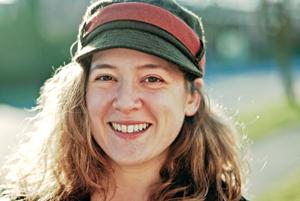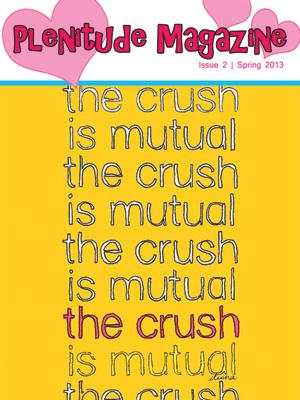
Victoria writer Andrea Routley is the editor of Plenitude, a new queer arts and literature magazine.
“The crush is mutual,” reads the cover of Plenitude Magazine, issue number two.
When Victoria-based writer and editor Andrea Routley collected submissions for the second installment of her electronic publication, she was surprised how organically an amorous trend emerged. “By collecting all these pieces — so different, yet linked — I think we help complicate what ‘queer’ and ‘love’ can mean,” she says of the issue’s theme. “I think it’s so cool to find these trends in submissions. It feels like, in some way, we’re all tapped into each other.”
Routley created Plenitude Magazine after identifying a lack of representation in the literary world. Searches for queer, English-language literary mags turned up little, and none in Canada. “I went looking for these magazines for the same reason many of us read — to see ourselves reflected in story or to learn something about people or characters different from ourselves.”
She says the magazine’s mandate is to promote content that not only features queer characters, but also comes directly from queer writers and artists. Routley brought together an editorial board of accomplished, practising professionals, people she respected. Though only in its second issue, the magazine has already earned well-deserved attention locally and beyond, with people accessing it from all over the world. Indeed, work by two Canadian authors published in Plenitude’s inaugural issue will be included in an upcoming anthology, Best Gay Stories 2013.
The magazine is a biannual collection of creative writing chock full of fresh and engaging work. Routley promises “something for every reader,” and that’s no stretch of the truth. The second issue features poetry, fiction and non-fiction short stories by more than a dozen writers, ranging in topics from first love, to an adoration of onions that may be more than culinary.
“I have a special love for a piece with a sense of humour,” Routley says. “Megan Backer’s poem ‘The Internet Has Since Rendered My Childhood Useless’ really made me laugh. In my notes for myself, I wrote beside her submission, ‘Thank you, Megan Backer, you are fucking hilarious.’”
The work of Vancouver-based Alex Leslie turns lesbian erotica into lyrical poetry, while a story by Sigal Samuel describes a sadness competition with a friend and Samuel’s complicated (and hilarious) relationship with melancholy.
With Plenitude, Routley hopes to challenge dominant literary narratives of the queer community. She remembers reading stories featuring queer characters in creative writing courses; her classmates would immediately search for themes of shame or coming out.
“Canada needs a venue where we don’t have to write our way past these queer narratives that have dominated mainstream representations,” she says. “I don’t want to clarify the sexual history of every character because this theoretical ‘average reader’ is unfamiliar with queer histories and cultures, for example. If I did that, then every story would be like a new conversation with a stranger. If we’re always introducing ourselves, how can we really dig in?”
This passion to share new, challenging, unapologetically queer stories is just one of many things to love about Plenitude. The cover certainly doesn’t lie: the crush is mutual.
A one-year subscription to Plenitude Magazine is $10. plenitudemagazine.ca


 Why you can trust Xtra
Why you can trust Xtra


